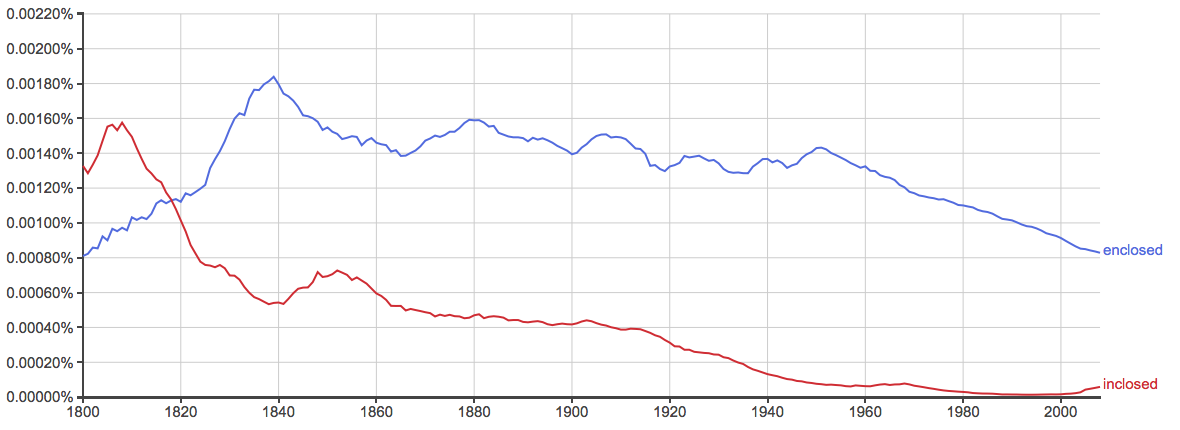It would make all of our lives simpler if words had one universal, mutually agreed-upon spelling that never changed. While we’re at it, word meanings, pronunciations, and conjugations could be standardized, too.
That’s not how English works, though. Languages need to be able to change to meet the changing needs of the people who use them. That’s why meanings can shift over time, and even simple things like word spellings can change.
Enclosed and inclosed are two different spellings of the same word. There was a point in time where you could get away with either version, but today, only one version is standard.
Continue reading to learn which it is.
What is the Difference Between Inclosed and Enclosed?
In this post, I will compare enclosed vs. inclosed. I will outline the correct spelling for the 21st century and use it in a few example sentences so you can see its proper context.
Plus, I will show you a helpful memory tool that you can use as a reminder of whether enclosed or inclosed is correct.
When to Use Enclosed
 What does enclosed mean? Enclosed can be a verb or an adjective.
What does enclosed mean? Enclosed can be a verb or an adjective.
As a verb, enclosed is the simple past tense form of the verb enclose, which means to seal something within something else. Someone might enclose a check within an envelope, for instance.
Here are a few more examples,
- We have enclosed an invitation to our wedding ceremony, which will take place at an undecided location on a date we have not set.
- Enclose the food within a well-sealed container, so that it does not leak on the way home from the restaurant.
Sometimes, enclosed is an adjective, where it modifies a noun to describe the quality of being within something else. Here are a few examples:
- The enclosed check represents payment in full for all services rendered.
- The enclosed eviction notice says that we need to leave within 72 hours!
When to Use Inclosed
 What does inclosed mean? Inclosed is an alternative spelling of enclosed. Today, it is considered archaic and nonstandard.
What does inclosed mean? Inclosed is an alternative spelling of enclosed. Today, it is considered archaic and nonstandard.
As you can see from the chart below, it was already falling out of favor by the turn of the 20th century:

This chart graphs inclosed vs. enclosed in English book since the year 1800, which means it doesn’t include other mediums like newspaper, magazines, periodicals, etc.
Still, we can see a long-term usage trend that favors enclosed over inclosed.
Inclosed was more popular in British English, but even there it fell dramatically out of favor around 1820.
Trick to Remember the Difference
Today, you should always use enclosed. Inclosed is no longer considered a standard variant, and many readers would even see it as a misspelling.
The same is true for other words related to enclosed: use enclose, encloses, and enclosing instead of inclose, incloses, and inclosing.
Since enclose has multiple E’s, like envelope, it should be easy to remember that things are enclosed in envelopes.
Summary
Is inclose or enclose? Enclose and inclose are spelling variants of a word that means to place within as a verb, and placed within as an adjective.
Today, enclose is the only standard variant; inclose has fallen by the wayside.
To summarize,
- Enclose is the correct spelling.
- Inclose is now considered a misspelling.
Contents
